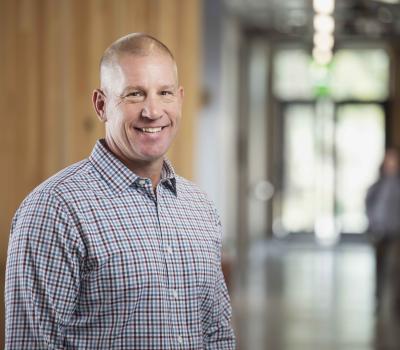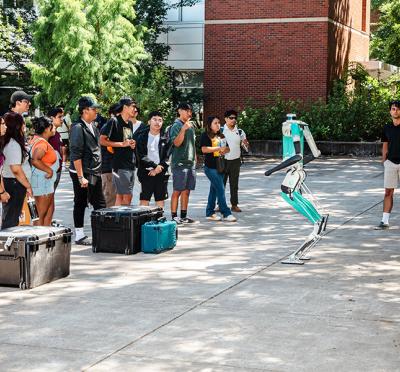Working toward bachelor’s degrees in energy systems engineering and sustainability at Oregon State University-Cascades in Bend, Dallas Bennett is dedicated to designing greener systems on a local level.
“I’m from Silverton, Oregon,” Bennett said. “Growing up in a small town, I have a tight-knit sense of community. It would be really nice to work directly with any community that I’m a part of.”
In Silverton, Bennett’s parents own a restaurant. Originally envisioning a similar career, she entered OSU-Cascades as a business major in 2019. However, when the pandemic struck, she reevaluated her goals and explored other degree options. In 2020, she took an introductory course in mechanical, industrial, and manufacturing engineering; for Bennett, this was enough to confirm her love of engineering and put her on a path toward a bachelor’s in energy systems engineering.
“I’ve always wanted to build things. The energy systems engineering program seemed like a good opportunity to push myself,” Bennett reflected. “It’s not the easiest degree, but I’ve definitely learned a lot.”
Besides engineering, Bennett has valued the concept of sustainability since childhood. Memories of her electricity-conscious grandmother and family camping trips at Detroit Lake firmly instilled in her the importance of environmental preservation.
“At campgrounds, I’d see places being affected by the more intense fires and natural disasters,” Bennett said. “That played a big role in my interest. Sustainability is a much bigger picture than just yourself; it has to be a societal change.”
In 2021, Bennett joined the OSU-Cascades Energy Systems Laboratory managed by Chris Hagen, associate professor of energy systems engineering and interim director of research. There, she started out writing grant proposals for research funding, but her work became more hands-on that December, when she received a Layman Fellowship to conduct undergraduate research with a faculty mentor.
Bennett’s Layman project with Hagen, which she presented at the OSU-Cascades Student Research and Scholarship Symposium in May, entailed modifying a fan to better control temperature and heat emissions from wood stoves to make the stoves burn more cleanly.
“We were interested in seeing the effect of air from a fan and how it controlled our heat source, a fake log,” Bennett said. “I ended up controlling the fan speed to stay at a set temperature, although the heater produced different amounts of heat at different times.”
Now, Bennett’s research project has become her ongoing work with Hagen. Most recently, she has been disassembling and rewiring space heaters to determine a framework for an upgraded heat-control system for the stoves. She will continue to add components to her design until it eventually functions as she intended.
“Because wood stove emissions are partially burned, we’re releasing things in the air that shouldn’t be,” Bennett explained. “But if we find the perfect temperature at which wood burns fully, and its emissions are at the right levels, it’ll be a cleaner burn. So, we’ll retrofit fans onto older wood stoves and make them smart controlled based on the stove temperature.”
Hagen noted that Bennett has “a passion for clean energy research and leadership with laboratory skills beyond some graduate students.” He also appreciates Bennett’s positive attitude and collegiality, which enhances the team dynamic in his lab. “I can speak for my entire research group by saying we all thoroughly enjoy working with Dallas,” he said.
Hagen encouraged Bennett and her lab mates, graduate student Bridger Cook and computer science Layman Fellow Seth Weiss, to enter the Hydrogen Business Case Competition, part of the Department of Energy’s American-Made Challenge series.
“The challenge was to create a business case for people to see if hydrogen is suitable for their community and how it fits into other energy systems,” Bennett said. “The first phase was outlining what we wanted to do and what we wanted to focus on, which ended up being biomass gasification.”
For phase 1 of the competition, teams across the nation conceptualized user-friendly analysis tools to pinpoint business opportunities with clean hydrogen energy for local economies. For phase 2, a select few teams with the most promising tools were tasked with designing them. One of those teams was Bend Hydrogen — Cook, Bennett, and Weiss — who offered up the Biomass gasification Optimal Business Case Analysis Tool, or BOBCAT.
“Bridger, a grad student, is actually doing a lot of work in biomass gasification and has a different grant working on some of that, so he definitely took the lead,” Bennett explained. “He coded and did foundational work on BOBCAT. Then, I made it more user-friendly and double- checked his work, which involved many formulas, and revamped our model in the end to make sure it looked clean and professional.”
Bend Hydrogen won second place overall in the competition, receiving $30,000 and DOE- sponsored internships with organizations of their choice.
As Bennett contemplates her internship options, she will continue to enjoy her research and courses, weekly bouldering as a member of the OSU-Cascades Rock Climbing Club, and the endless outdoor recreation that her adopted community offers.




